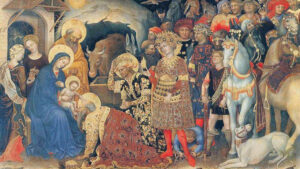Fr Neil’s homily for the Epiphany, 6 January 2022
All those from Sheba shall come. They shall bring gold and frankincense, and shall proclaim the praise of the Lord.¹
Matthew is writing to tell the gospel of Christ to a mainly Jewish audience. It influences what he is inspired by the Holy Spirit to include in his account of Christ.
Matthew is at pains to make clear that Christ is the Messiah foretold by the prophets, hence his constant reference to the Law and the prophets in the scriptures. These strange figures that appear from the East have a particular role to play in the unfolding revelation of God.
These visitors in the Christian tradition are referred to as both wise men or Magi and kings. This is because Matthew infers a connection to our first reading from the prophet Isaiah and also psalm 72. A king will be born whose greatness will be recognised in gifts of tribute for “they bring gold and frankincense”¹ and “May the kings of Sheba and Seba bring gifts! May all kings bow down before him, all nations serve him.”²
The wise King figures alluded to the greatest wise King of antiquity, Solomon, whose fame reached the ends of the earth. Indeed the Queen of Sheba came to hear his wisdom and be overwhelmed: “she gave the king a hundred and twenty talents of gold, and a very great quantity of spices, and precious stones; never again came such an abundance of spices as these which the queen of Sheba gave to King Solomon.”³
Matthew would later record the words of the Lord himself when he stated, “The queen of the South will arise at the judgment with this generation and condemn it; for she came from the ends of the earth to hear the wisdom of Solomon, and behold, something greater than Solomon is here.”⁴
Matthew is not only connecting up the dots for his readers, but also lays a warning not to be blinded to who Christ is and so fall on the wrong side of God’s judgement.
Creation itself rejoices and seeks to fulfil its vocation by bearing witness too, pointing the way to the king of kings. This is most notable in the appearing of the star, but also with the choir of angels before the shepherds and the ox, ass and sheep that almost certainly would have been stabled near by.
These Gentile kings had read the signs of the times and travelled many miles to offer tribute and worship. If creation and the Gentiles could see this, then surely God’s own people ought to? Here is the promised king who would establish an eternal kingdom that would reach beyond the borders of Israel to the ends of the earth and indeed to eternity itself.
What has this scripture story from two thousand years ago got to do with us today? The attitude which asks that question is also present in Herod who saw these old prophesies as troublesome because they fed the unrest and false expectations of the people he ruled. Any news of a new king would unsettle the people more and threaten his own position of power. If he couldn’t control the people then Rome would replace him. To Herod the scriptures were a dead letter, and not the living word of God that can help transform and lead the one who hears with his heart, as well as his mind, to life.
I wonder what our own attitude to scripture is? The power of God at work in the scriptures and our living tradition can so easily be forgotten. To forget is to be blinded to the movement of the Holy Spirit and can mean we miss the moment of grace and healing for our souls.
These wise men show us that God’s revelation in creation and in the scriptures will always lead those who seek true wisdom to Christ — God made manifest. This is as true today as it was when the magi first appeared. At a point when many in the Church have lost their nerve to speak with conviction about God, and have too often morally capitulated to the whims of the world, there are others raising the alarm. These alternative voices, such as those on the intellectual dark web, while not identifying as Christians, are articulating boldly the dangers of the loss of religion and belief in God.
I would not agree with some or much of what they say, yet the search for truth has led a number of them — to their own surprise — to recognise that the loss of God to society is toxically damaging. The recovery of faith is essential to any community’s long-term health.
Maybe it will need the alien, the stranger and the agnostic, who are searching for true wisdom, to lead many of us back to recognise the King of Kings; that the gospel isn’t just a cultural phenomenon of the Christian community but a revelation for all creation, all humanity, across all times.
Without the King of Kings as the centre of our lives, society will inevitably make idols of riches, pride and honour. That is an unforgiving religion which will seek to destroy all that stands in its way.
The way of life begins with us bringing all that we are and kneeling with the wise men before the Babe of Bethlehem, God’s love and our salvation made flesh.
¹ Isaiah 60:6
² Psalm 72:10–11
³ 1 Kings 10:10
⁴ Matthew 12:42; Luke 11:31








 Posts
Posts